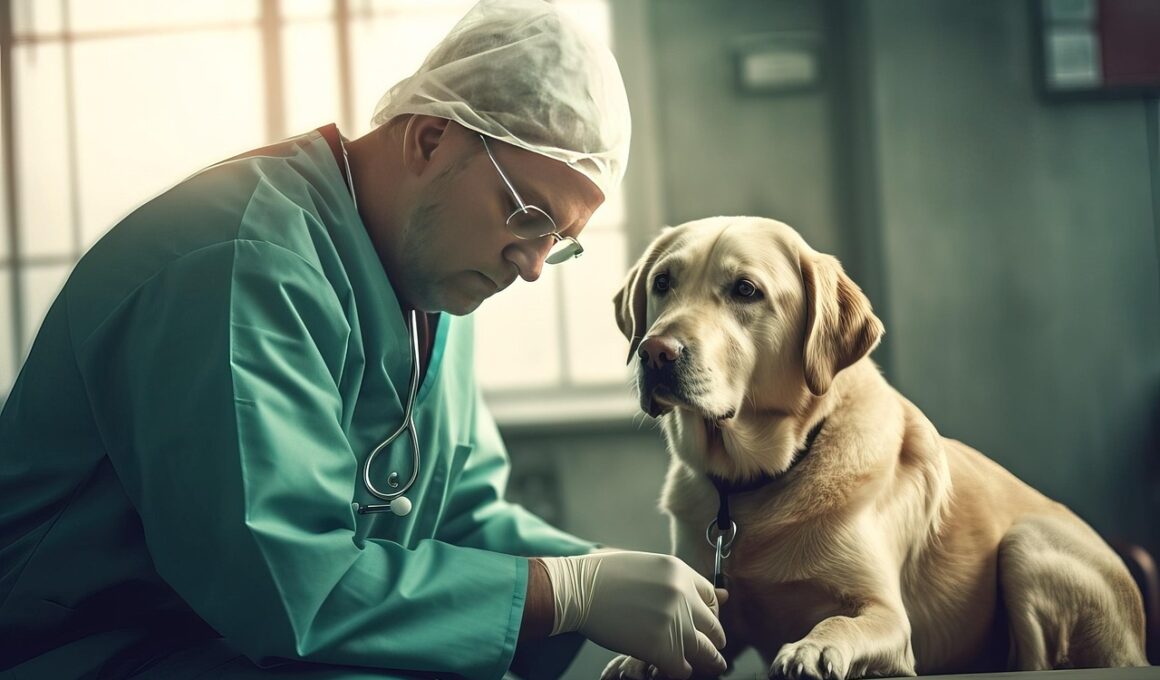How Regular Vaccinations Help Monitor and Improve Dog Health
Regular vaccinations are essential for maintaining the health and well-being of our furry companions. They protect dogs from various infectious diseases that can be deadly if not prevented. Vaccinations also support the body’s immune system, allowing it to fight off potential pathogens. For instance, core vaccines such as rabies, canine distemper, and parvovirus are crucial for all dogs regardless of lifestyle. Non-core vaccines are also available depending on a dog’s lifestyle and risk factors. Regular visits to a veterinarian allow owners to stay updated on their dog’s vaccination schedule, ensuring they receive the necessary vaccines at the right time. Furthermore, these visits provide an opportunity for health assessments. Veterinarians can check for any underlying health issues during vaccinations, thus facilitating early detection and intervention if needed. Owners can also seek advice on general health care, such as diet and exercise, in these sessions. Regular vaccinations and health monitoring create a proactive approach to dog health, ultimately minimizing the risk of severe illnesses. Prioritizing vaccinations, combined with vigilant health monitoring, creates a solid foundation for a longer, healthier life for dogs.
Vaccinations not only shield dogs from communicable diseases, but they also enable pet owners and veterinarians to maintain a health monitoring routine that identifies issues early on. When dogs receive their routine shots, veterinarians conduct thorough health evaluations during these visits. This typically includes checking vital signs, assessing weight, and examining the skin and coat for potential allergies or parasites. Consequently, if any anomalies are found, veterinarians can recommend immediate action. Regular vaccinations reinforce the recognition of potential diseases that often go unnoticed until they become severe. These proactive visits encourage conversations between dog owners and health professionals, fostering deeper understanding of animal care. Understanding changes to a dog’s overall health can also help owners adjust their care routines accordingly. Additionally, discussing behavioral changes with a vet can provide crucial insights into any underlying issues linked to the animal’s physical health status. Such open communication between pet owners and veterinarians leads to a collaborative approach towards maintaining optimum dog health. Regular vaccinations create routine checks while providing valuable information that can help in preemptive health care decisions for dogs, ultimately leading to better outcomes and quality of life.
Importance of Core Vaccinations
Core vaccinations are vital in protecting dogs against severe and often fatal diseases. Vaccines like the rabies vaccine are not only required by law in many areas, but they also safeguard your furry friend from potentially dangerous exposure. Similarly, the canine parvovirus vaccine prevents a highly contagious disease that can be financially burdensome and distressing to tackle. Canine distemper, another critical core vaccine, protects against a viral disease that severely affects the respiratory, gastrointestinal, and central nervous systems of dogs. By vaccinating against these core diseases, dog owners can ensure the overall well-being of their pets. Furthermore, keeping all dogs in a household up to date on vaccinations helps protect the community. Vaccinated animals prevent outbreaks and limit the spread of diseases to both pets and humans. Thus, community-wide vaccination initiatives play a role in safeguarding not only individual pets but the broader population of dogs. Core vaccinations, along with diligent health monitoring, form an integral part of responsible pet ownership. Ultimately, prioritizing core vaccinations contributes to a healthier and more sustainable canine community.
While core vaccines are crucial, non-core vaccinations also play a significant role in certain environments. Depending on where a dog resides or frequents, non-core vaccines protect against diseases that may pose unique threats based on lifestyle. For instance, dogs that frequently interact with other dogs at parks or boarding facilities may need the Bordetella bronchiseptica vaccine, which protects against kennel cough. Additionally, the Lyme disease vaccine is recommended for dogs living in or traveling to areas where ticks are prevalent. Each dog has unique exposure levels, thus requiring tailored vaccination plans that consider individual lifestyles and risks. Regular consultations with a veterinarian allow for the adjustment of vaccination schedules to address these unique needs and help in disease prevention. Such tailored vaccination strategies reinforce the health profile of dogs, enabling more focused health monitoring during appointments. Moreover, these vaccinations serve as a catalyst for conversations regarding the overall health and behavior of dogs. Engaging with pet owners on preventative measures encourages proactive health management, making the ongoing health assessments vital for achieving a long and vibrant life for every dog.
Canine Health Monitoring During Vaccination
Dog vaccinations present an excellent opportunity for health monitoring, creating a seamless process to ensure the well-being of pets. Regular visits to the veterinarian during vaccination appointments help establish ongoing health records, noting any changes over time. This information assists in tracking potential health issues that can develop gradually. For example, weight gain or loss might indicate underlying health concerns. Such observations are crucial as early detection can significantly impact treatment outcomes. Veterinarians often recommend additional tests or treatments based on these assessments during vaccination visits. This proactive approach facilitates timely interventions, which can significantly improve life quality for dogs as they age. Moreover, the bonding and trust developed between the vet, owner, and dog play a crucial role in ensuring the animal’s comfort and well-being. Healthy dogs typically show signs of their mental and emotional health through their behavior. Regular vaccinations create a cycle of health checks and evaluations, ensuring that canines lead fulfilling lives while simultaneously safeguarding their health. Owners play an important role in recognizing changes, and discussing these observations with veterinarians leads to better tailored care plans.
Vaccinations also reinforce the importance of routine health assessments that track and document progress in a dog’s well-being. For instance, assessing the efficacy of existing vaccinations over time ensures that they remain effective against prevalent diseases. Furthermore, regular evaluations during vaccination appointments allow for updates to dietary needs, exercise recommendations, and weight management plans. Veterinary professionals can suggest modifications based on the dog’s age, breed, and lifestyle, ensuring that nutritional needs are met. Consequently, a healthy diet combined with vaccinations leads to healthier immune response systems. Monitoring any fluctuations or patterns in behavior or health during these assessments aids in the understanding of the dog’s overall wellness. Pet owners can also be alerted to other conditions, such as obesity or dental problems, that may adversely affect their dog’s health. Regular vaccinations create a conducive environment for ongoing health care dialogue, leading to informed decisions. Pet owners can act swiftly on their vet’s recommendations, creating a comprehensive strategy for their dog’s long-term health and wellness. Both vaccinations and health assessments work together to enhance the quality of life for dogs while promoting their overall health.
Conclusion: The Path to Better Dog Health
Regular vaccinations are paramount not only to prevent diseases but also as an opportunity for ongoing health monitoring. They facilitate essential health assessments that alert pet owners to any warnings or concerns that vets present. Vaccination appointments can pave the way for critical discussions surrounding nutrition, behavior, and overall wellness. Proactive vaccinations create a culture of health awareness among dog owners while ensuring safe environments for all pets within a community. Knowledge of the essential vaccines and importance of non-core vaccines shapes responsible pet ownership, minimizing exposure to preventable diseases. This comprehensive approach fosters healthy dogs who are less prone to illnesses and are able to enjoy active lifestyles. The protective measures instilled through vaccinations offer peace of mind to pet owners, driving commitment to their dog’s health. Ultimately, vaccinations and health monitoring are intertwined as they forge a path towards longer and healthier lives for dogs. Prioritizing both not only enhances individual pet health but contributes to the safety and health of the broader canine community. Taking these measures creates a lasting legacy of health, happiness, and longevity for our beloved furry companions.



